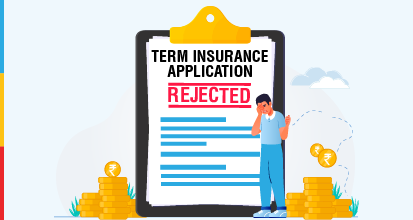Written by : Knowledge Centre Team
2025-12-29
1017 Views
5 minutes read
Share
A whole life insurance plan is a type of permanent life insurance plan. It means that the policyholder will be covered for their entire life provided the premiums are paid on time. Whole life insurance is different from term life insurance, which covers you for a period ranging between 10 to 30 years.
Moreover, the whole life insurance is the most frequently purchased permanent life insurance policy, according to the Insurance Information Institute (III). The maturity age for a whole life insurance policy is 100 years, and you can withdraw the term policy or borrow against it anytime. The policy will become matured endowment if the policyholder lives past the maturity age.
Whole life insurance policies cover you for your entire lifetime, and in case if you pass, the policy beneficiaries must file a claim with the insurer. The insurer will then review the circumstances of your passing and will grant the payout (also called the face value or death benefit of the policy) as long as everything is in order.
A whole life insurance policy is different from other types of life insurance policies. You need to understand how it works to decide whether it is a fit for you or not. A whole life insurance plan can be purchased through different payment plans, including a one-off sum, a monthly plan, and a yearly plan.
If you opt for a unit-linked whole life policy, then the payment made by you is not only directed towards the purchase of your insurance plan for payment of the sum assured, but a reminder of the amount is invested in an investment fund. You can also regularly review the policy to analyze whether the value of the policy is equal to the cost of life assurance it provides.
Also Read - Difference Between Life Insurance and Life Assurance
In case the remaining amount which is invested in an investment fund is not performing well enough to cover the cost of benefits, the insurer might suggest you either increase your regular contribution or reduce the amount of sum assured. Also, some whole life insurance policies give you the option to obtain cover against a specific disability or illness.
You also need to inform your family members about those who are all the beneficiaries of your life insurance policy because if they don't know that they are the beneficiaries, they might not be able to claim the assured sum should you pass.
You can avail different types of whole life insurance policies that are available in the market. They are designed to cater to different types of requirements. Let us look into the details to get a clear understanding.
The advantage of this whole life insurance policy is that it gives you the stability and convenience in knowing how much money is owed on the premium each month. Also, the premiums are standardized and will never increase.
The advantage with this whole life insurance policy is that the policy is immediately paid and will have a substantial cash value that can be left to grow tax-deferred or can be borrowed against. The downside of this policy is that you might need to pay a significant fee if you surrender the policy during the first few years.
A whole life insurance plan comes with certain financial benefits, such as:
Canara HSBC Life Insurance offers several whole life insurance policies and some of the best term plans. These keep you and your family financially protected for years to come. Choose a suitable plan for you today and make your future a secured one!
An OTP has been sent to your mobile number

Sorry ! No records Found
Thank You for submitting the response, will get back with you.
Disclaimer - This article is issued in the general public interest and meant for general information purposes only. The views expressed in this blog are solely those of the writer and do not necessarily reflect the official policy or position of Canara HSBC Life Insurance Company Limited or any affiliated entity. We make no representations or warranties of any kind, express or implied, about the completeness, accuracy, reliability, suitability, or availability with respect to the blog or the information, products, services, or related graphics contained in the blog for any purpose. Any reliance you place on such information is therefore strictly at your own risk. You should consult with a qualified professional regarding your specific circumstances before taking any action based on the content provided herein.









We bring you a collection of popular Canara HSBC life insurance plans. Forget the dusty brochures and endless offline visits! Dive into the features of our top-selling online insurance plans and buy the one that meets your goals and requirements. You and your wallet will be thankful in the future as we brighten up your financial future with these plans.